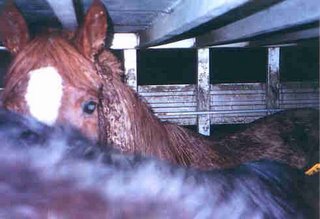Cynical House Debate About Horse Consumption Ban
This post is for the animal rights crowd
 In the eighth century A.D., Pope Gregory III banned the consumption of horse meat. Historians debate whether the ban was the result of a continent-wide horse shortage, or that the practice resembled pre-Christian pagan rituals. Today, even though horse meat is as nutritious as any hoofed animal, in plentiful supply, widely consumed in much of Europe and Asia, and quite tasty (so I've heard), Americans still adhere to the religious taboo. Yesterday, the House of Representatives voted to ban the slaughter of horses in the U.S. for human consumption. Almost all of the slaughtered horse meat is exported to tables abroad. As is typical of our elected heroes, they took a complex issue and tried to make it into a "my-opponents-love-to-club-baby-seals" mockery of the issue at hand. A wonderful report from NPR can summarize.
In the eighth century A.D., Pope Gregory III banned the consumption of horse meat. Historians debate whether the ban was the result of a continent-wide horse shortage, or that the practice resembled pre-Christian pagan rituals. Today, even though horse meat is as nutritious as any hoofed animal, in plentiful supply, widely consumed in much of Europe and Asia, and quite tasty (so I've heard), Americans still adhere to the religious taboo. Yesterday, the House of Representatives voted to ban the slaughter of horses in the U.S. for human consumption. Almost all of the slaughtered horse meat is exported to tables abroad. As is typical of our elected heroes, they took a complex issue and tried to make it into a "my-opponents-love-to-club-baby-seals" mockery of the issue at hand. A wonderful report from NPR can summarize.Animal right activists could justifiably line up on either side. On the one hand, the U.S. Humane Society claims that the 3 horse slaughter plants (all foreign-owned) in operation on domestic soil are unjustifiably cruel in their operation. They allege that old and feeble animals are transported in cramped conditions to the plants. Since federal mandates require that the animals be unconscious, a metal rod is then injected into their brains before they are hoisted by their hind-quarters to a hideous machine that then cuts their throat. Some claim that not all animals are unconscious. On the other hand, veterinary groups oppose the ban because, in their opinion, slaughter is more humane than growing old and sick. As any horse owner knows, care and feeding of a horse is not an inexpensive pursuit. True, we would wish that humanity would treat our animal companions better, but we know that tens of thousands of animals are discarded after their usefulness ceases. Even former Kentucky Derby winners have been rendered into food.
Curiously absent from the debate was the question of commercial interests rounding up wild horses on public lands for sale to the slaughterhouses. Even more absent was the chance to talk about the inefficiency, corruption, and environmental damage caused by all meat consumption. Those would be worthwhile debates, even considering other pertinent issues in front of the house, like... oh, say... the Iraq War, the Hezbollah-Israeli War, nuclear proliferation, social security, and health care. Instead, we just had representatives recalling their days of rugged, outdoorsy horse companionship. So much for the substantive debate.














0 Comments:
Post a Comment
<< Home